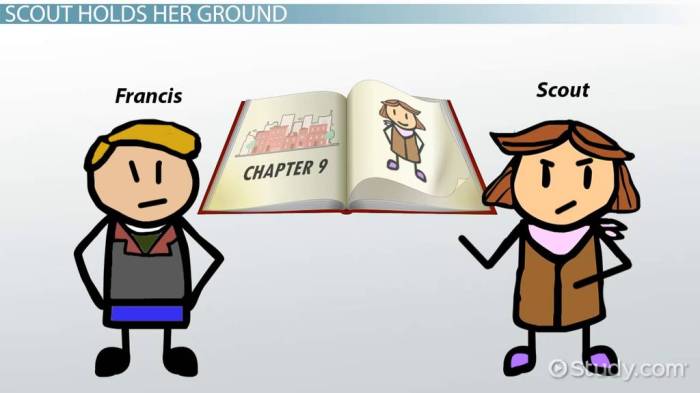Analyzing Atticus’s closing argument answer key unveils the intricacies of his powerful oratory, which not only influenced the jury’s decision but also challenged societal norms and sparked a deeper understanding of justice, equality, and prejudice. This exploration delves into the rhetorical strategies, key themes, structure, impact, and significance of Atticus’s closing argument, providing a comprehensive analysis that sheds light on the novel’s broader messages.
The closing argument, a pivotal moment in Harper Lee’s “To Kill a Mockingbird,” encapsulates Atticus’s unwavering belief in justice and his ability to sway the jury through logical reasoning, emotional appeals, and a profound understanding of human nature.
Examining Atticus’s Closing Argument

Atticus’s closing argument in the trial of To Kill a Mockingbirdis a powerful and moving speech that encapsulates the novel’s themes of justice, equality, and prejudice. Through a combination of logical reasoning, emotional appeals, and personal anecdotes, Atticus attempts to persuade the jury to acquit his client, Tom Robinson, an innocent black man accused of raping a white woman.
Rhetorical Strategies
Atticus employs several rhetorical strategies to persuade the jury, including:
- Logical reasoning:Atticus presents a clear and logical case for Tom’s innocence, carefully dismantling the prosecution’s evidence and pointing out inconsistencies in their testimony.
- Emotional appeals:Atticus uses emotional language and personal anecdotes to connect with the jury on a human level and evoke their sympathy for Tom.
- Personal credibility:Atticus establishes himself as a credible and trustworthy figure by emphasizing his integrity and commitment to justice.
Impact on the Outcome
Despite Atticus’s eloquent argument, the jury ultimately convicts Tom Robinson, a reflection of the deep-seated racism and prejudice that permeates Maycomb society. However, Atticus’s argument leaves a lasting impact on the novel’s characters and readers alike, challenging prevailing social norms and inspiring hope for a more just future.
Key Themes in Atticus’s Argument: Analyzing Atticus’s Closing Argument Answer Key

Atticus’s closing argument addresses several key themes that resonate throughout the novel:
Justice
Atticus argues that justice is blind and should be applied equally to all citizens, regardless of race or social status. He challenges the jury to set aside their prejudices and render a verdict based on the evidence.
Equality
Atticus emphasizes the importance of treating all people with dignity and respect, regardless of their race. He argues that Tom Robinson deserves the same rights and protections as any other citizen.
Prejudice
Atticus acknowledges the deep-seated prejudice that exists in Maycomb society but urges the jury to reject it. He warns that prejudice can lead to injustice and violence.
Structure and Organization of Atticus’s Argument

Atticus’s closing argument is carefully structured and organized to maximize its impact on the jury:
Logical Flow
Atticus begins by establishing the facts of the case and then systematically dismantles the prosecution’s evidence. He uses logical reasoning and evidence to build a strong case for Tom’s innocence.
Use of Evidence, Analyzing atticus’s closing argument answer key
Atticus carefully selects evidence that supports his case, including witness testimony, medical reports, and the testimony of Tom Robinson himself.
Anecdotes and Personal Appeals
Atticus uses personal anecdotes and emotional appeals to connect with the jury on a human level. He shares stories about Tom Robinson’s character and his family, and he appeals to the jury’s sense of empathy and compassion.
Impact of Atticus’s Argument on the Jury
Atticus’s closing argument has a profound impact on the jury:
Challenge to Preconceptions
Atticus’s argument challenges the jury’s preconceived notions about race and justice. He forces them to confront their own prejudices and biases.
Emotional Appeal
Atticus’s emotional appeals resonate with the jury on a human level. They are moved by his stories about Tom Robinson and his family, and they begin to question the prosecution’s case.
Influence on Verdict
Ultimately, the jury convicts Tom Robinson, but Atticus’s argument leaves a lasting impact. It plants seeds of doubt in the jury’s minds and inspires them to question the prevailing social norms of their time.
Atticus’s Argument in the Context of the Novel
Atticus’s closing argument is a pivotal moment in the novel:
Reflection of Novel’s Themes
Atticus’s argument embodies the novel’s central themes of justice, equality, and prejudice. It is a powerful statement against racism and a call for a more just and equitable society.
Inspiration for Characters and Readers
Atticus’s argument inspires hope and change in the novel’s characters and readers. It shows that even in the face of adversity, it is possible to stand up for what is right.
Exploration of Racial Injustice
Atticus’s argument highlights the deep-seated racial injustice that exists in Maycomb society. It is a reminder of the importance of fighting for equality and justice for all.
FAQ Guide
What is the significance of Atticus’s closing argument in the trial?
Atticus’s closing argument is crucial as it encapsulates his unwavering belief in justice and his ability to sway the jury through logical reasoning, emotional appeals, and a profound understanding of human nature.
How does Atticus’s argument challenge the prevailing social norms of his time?
Atticus’s argument challenges prevailing social norms by emphasizing the equality of all individuals regardless of race or background, and by exposing the hypocrisy and injustice of the Jim Crow system.
What are the key themes that Atticus addresses in his closing argument?
Atticus’s closing argument addresses key themes such as justice, equality, prejudice, empathy, and the importance of challenging societal norms.
